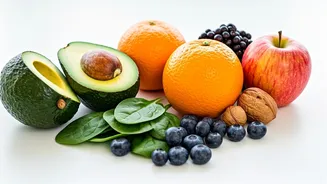Oats: Heart's Best Friend
Oats stand out as an excellent choice for those seeking to lower cholesterol naturally. This is largely due to their high soluble fiber content. This type
of fiber works by binding with cholesterol in the digestive system, preventing its absorption into the bloodstream. Regular consumption of oats can significantly reduce LDL (bad) cholesterol levels. Furthermore, oats can also keep you satiated for longer, which aids in weight management—another factor that positively affects cholesterol. You can enjoy oats in various forms: as a simple breakfast porridge, added to smoothies, or used in baking. Aim for at least a half-cup serving of dry oats daily to experience the benefits.
Nuts: Powerhouse of Goodness
Nuts offer a delectable and nutritious way to help lower cholesterol. Various types of nuts, especially almonds, walnuts, and pecans, are packed with healthy fats, fiber, and plant sterols. These components contribute to lowering LDL cholesterol. Plant sterols block the absorption of cholesterol in the gut. However, it’s essential to consume nuts in moderation, as they are calorie-dense. A handful (approximately 1.5 ounces) daily can provide substantial benefits. Opt for unsalted varieties to avoid added sodium. Nuts also make for a convenient and satisfying snack, easy to incorporate into your daily diet.
Fatty Fish: Omega-3 Boost
Fatty fish such as salmon, mackerel, and tuna are rich in omega-3 fatty acids. These beneficial fats are known for their ability to lower triglyceride levels and reduce the risk of heart disease. Omega-3s also modestly reduce LDL cholesterol. In addition to their heart-healthy properties, fatty fish are a good source of protein and essential nutrients. Aim to include at least two servings of fatty fish in your diet per week. Methods of preparation should include baking, grilling, or poaching, rather than frying, to maximize the benefits. The consumption of fatty fish supports overall cardiovascular health.
Olive Oil: Liquid Gold
Olive oil, particularly extra virgin olive oil, is a staple in many diets worldwide. It is packed with monounsaturated fats, which have a protective effect on heart health. These fats help to lower LDL cholesterol while maintaining or even raising HDL (good) cholesterol levels. Extra virgin olive oil also contains antioxidants, further contributing to cardiovascular well-being. Using olive oil for cooking or as a dressing on salads and vegetables is a simple yet effective way to incorporate it into your diet. Choose extra virgin olive oil whenever possible for the highest concentration of beneficial compounds. Moderation is key, although, olive oil provides substantial benefits.
Avocados: Creamy Cholesterol Control
Avocados, with their creamy texture and mild flavor, are another excellent food for managing cholesterol. They are rich in monounsaturated fats, similar to olive oil, and help reduce LDL cholesterol levels. Avocados also provide fiber and beta-sitosterol, a plant sterol that inhibits cholesterol absorption. Incorporating avocados into your diet can be both delicious and beneficial. Enjoy them in salads, sandwiches, or smoothies. A quarter to half an avocado per day can contribute to improved cholesterol levels. The healthy fats and nutrients in avocados make them a valuable addition to a heart-healthy eating plan.
Beans and Legumes: Fiber Power
Beans and legumes, including lentils, chickpeas, and kidney beans, are a powerhouse of soluble fiber, which plays a crucial role in cholesterol reduction. Soluble fiber binds to cholesterol in the digestive tract and aids in its removal from the body. They are also a good source of plant-based protein, supporting overall health. Incorporating beans and legumes into your diet can be done through a variety of recipes. They are versatile and can be added to soups, stews, salads, or as a side dish. Aim for at least a half-cup serving daily to experience their cholesterol-lowering benefits, which will also make you feel fuller longer.
Foods with Added Sterols
Certain foods have plant sterols added to them, which are known to block cholesterol absorption in the gut. These sterols are similar in structure to cholesterol, and they effectively compete for absorption. Foods like fortified margarine, yogurt, and orange juice can be a convenient way to increase your intake of plant sterols. Regularly consuming foods with added sterols can significantly help lower LDL cholesterol levels. Always check labels to see how much plant sterols are added per serving. Consuming these foods as part of a balanced diet can give a strong boost in your cholesterol management efforts.












